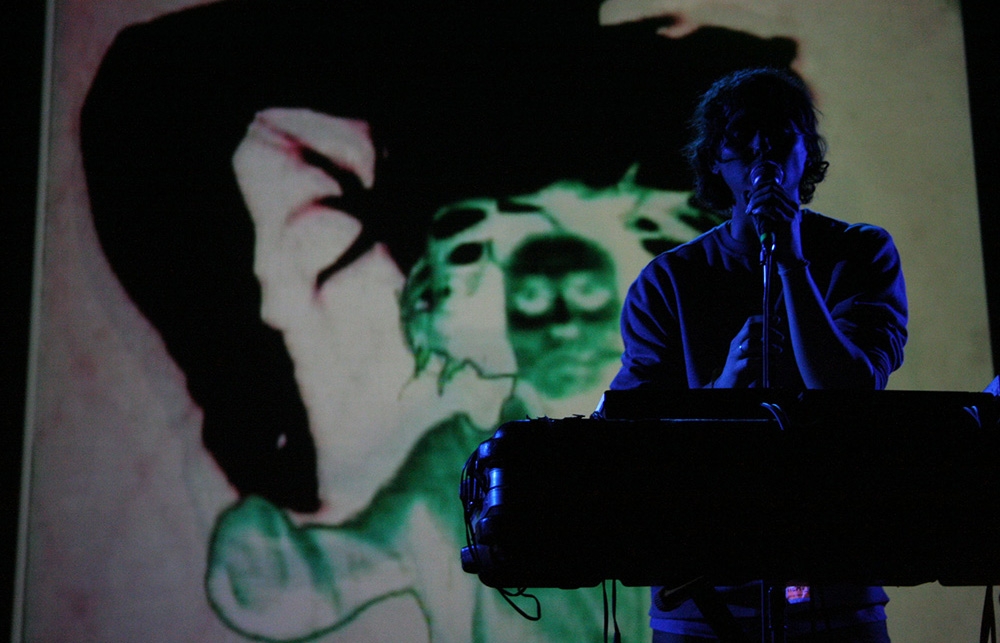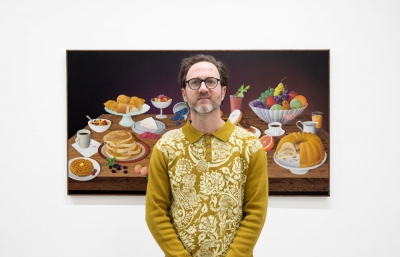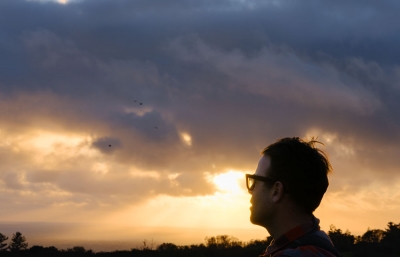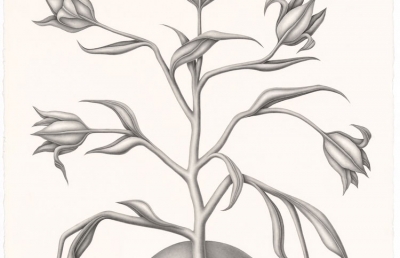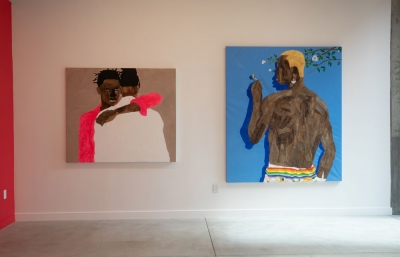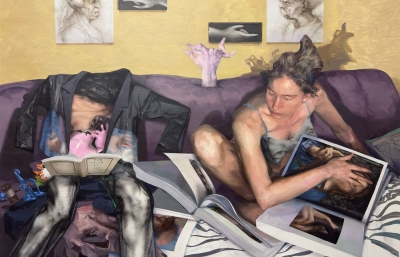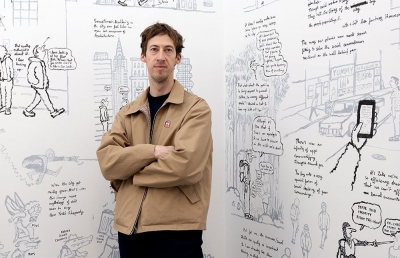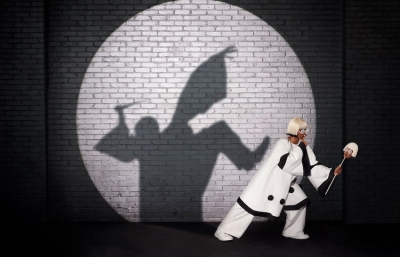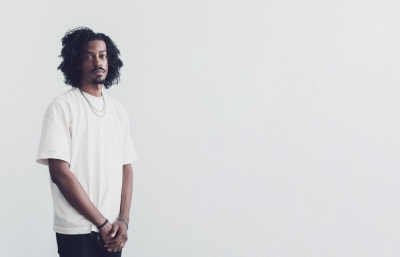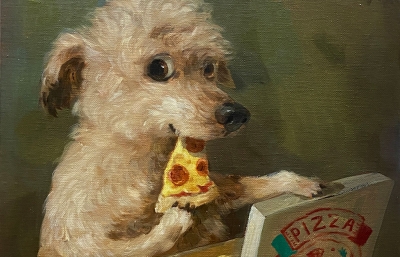Noah Lennox (AKA Panda Bear,) is just settling down after the release of his latest sonic-creation Buoys, a stripped-down collection of experimental music by the maker of groundbreaking albums like Person Pitch, Tomboy, and Panda Bear Meets The Grim Reaper. In addition to an ever-evolving music career, Lennox has championed cooperative audio-visual projects as both Panda Bear and in the band he co-founded, Animal Collective. A favorite collaborator has been another musician and visual artist, Danny Perez, who creates vivid, abstract video compositions to accompany Lennox’ organic compositions. We caught up with the duo on the outset of their tour to learn about their ongoing collaboration and musings on the information age.
Noah Lennox (AKA Panda Bear,) is just settling down after the release of his latest sonic-creation Buoys, a stripped-down collection of experimental music by the maker of groundbreaking albums like Person Pitch, Tomboy, and Panda Bear Meets The Grim Reaper. In addition to an ever-evolving music career, Lennox has championed cooperative audio-visual projects as both Panda Bear and in the band he co-founded, Animal Collective. A favorite collaborator has been another musician and visual artist, Danny Perez, who creates vivid, abstract video compositions to accompany Lennox’ organic compositions. We caught up with the duo on the outset of their tour to learn about their ongoing collaboration and musings on the information age.
Eben Benson: How's everything been with the album release? Have you started touring yet?
Danny Perez: So far, so good, as far as I know, and yes!
Noah Lennox: Yeah, we just started a U.S. run. We're in New York now, we've only done a couple shows thus far. We worked on this material live a few times over the summer, in the spring, and some other times before. This is the first concentrated run of this new material. It feels like the first time people know these songs, which is kind of nuts.
What’s it like when you notice people know the songs as opposed to them hearing it for the first time?
Noah: You can tell there's a different energy in the room, especially when we start a song and people will whistle or something like that. You sort of know that people recognize certain stuff, which is cool. I don't know if I feel too much of a difference. Maybe Danny has a different view.
Danny: I get a unique perspective from the back of the room. It's always kind of interesting and nice to hear some of the die-hard fans react. If I'm able to tune out the general rise of people that talk in the back of clubs.
Danny, what are you normally doing during the shows? How do you set up the video and what do you end up spending most of your time doing there?
Danny: It's kind of an exchange for me. With this tour, we have three screens, and we used to only have one. So there’s a lot more content, more screens, and more layers. I'm also working the lights and triggering the strobes, and those kinds of movements. It's more challenging for me live, but also super fun. I describe it to people as getting to make a movie soundtrack live.
I'm actually not using that many effects within the video programs. The bulk of my content creation happens before the tour, and then I mix and move them along with the music. On my end, it can evolve as the tour goes on. It gives a more physical, live element to what I do. I make things for certain songs, but by the end of the tour, I pretty much have it down to a recipe. I like that ability to improvise, throwing in little touches with the fading and timing. It keeps me on my toes.
How did you two meet and how long have you been working together?
Noah: We met on the first tour. The Animal Collective tape with Black Dice, which was in 2001. We've been buds ever since. I started making odd tracks and doing the first Panda Bear tours at the same time. We started live-collaborating in 2007.
How has the way you work together changed over time?
Danny: More the music, wouldn't you say?
Noah: Definitely. I try to do stuff that represents the tone and he's the visual realization of the song. For example, on previous albums the visuals were a lot grungier, collage-like, and bombastic. With Buoys, the production on it is very clear but bold. The new content I've been working on is a lot cleaner and singular. In that regard, there's definitely a direct correlation. I really don't like to tell Danny stuff like “This is what the new stuff sounds like, make stuff that looks and feels like this.”
Danny: As a visual artist, I am super lucky to have that kind of trust. I certainly try to match the mood and the aesthetic of the music, but I also like to pull stuff out of it that Noah might not. For example, sometimes I add stuff that's a little more sinister and ominous like slashes or certain images like that. It throws the music a little off-balance and can evoke an interesting reaction from the audience, instead of everything feeling saturated, clean, and candy-coated.
Noah: That's what I like about Danny's stuff, there are certain sensibilities that he and I share, but then, we also diverge. He brings color to music in a way that is really cool. In a way that wouldn't be there if it was just me.

Since you've been working together for a while, have you synced up the way you work together? I've read reviews that describe Buoys as minimalist, and I think it is, in a very Panda Bear-type way. Danny, have you found your work becoming more minimalist as well?
Danny: Certainly. For example, the cover, I wanted it to be minimal, yet bold. I feel like the production of the album is very lush, and is minimal but not weak. That's certainly not the synonym for minimal. There's a way to have things be minimal but strong at the same time. I would also just say it's more, less literally, but just more in practice, I take queues from Noah and a lot of our friends and peers. As far as, just wanting to do things differently and push yourself further every time. I think that's an important from our friends and everyone over the years.
How much of your practices do you consider intuitive versus conceptual? How does each play into your practices?
Noah: For me, the thing always starts conceptually. I spend a lot of time thinking about what I'd like to do, or what could be an attractive thing to do for me. Then, it's whatever feels good. I try to avoid thinking too hard after that initial conceptualizing phase.
Danny: Yeah. I'd say for me it's maybe more leaning towards the other. The initial seed is a lot more instinctual or manic, and that's my own kind of chaotic sensibilities. Then, I try to reverse everything. I’ll think, “oh, okay, this is what that means.” And now that I see A, B and C together, I get what D is, you know? As opposed to starting with D and wanting to go, “okay, now I build A and B etc....”. I feel it's a reflection of my own personality, latching onto stimulus and making a big mess, and then seeing what can be made of it.
That's cool to hear because I'll meet two people who make really rough, naïve paintings, and it will be that same kind of thing where one person goes, oh, this started all from feeling and then I just had to make sense of it conceptually and nail it into categories. And then vice versa for the other person. So, it's cool to see that playing itself out in totally different types of art making.
Danny: At the same time, I would also say that the link, or the through-line, between the visual and the sonic aspect of this collaboration, is Noah and his songs. I wait for him to send me tracks. Over the past 10 or 15 years that's always one of my favorite days of the year. When Noah or Dave or Erik, one of Black, send me an email with new shit they've been working on. I sit there and draw, blast it, and listen to it over and over again. That's the emotional reaction. The images and the colors just start swirling in my head. I start identifying with certain beats and such. It definitely starts with the music, I take my lead from that.
It’s like downloading a zip file and then unzipping the file yourself.
Danny: I mean, I consider myself very lucky. I'm also a fan, too. I love Noah's music, and as a visual artist, I really couldn't ask for a more fun, exciting palette to work with.
Noah: The feelings are mutual.

With your art, where do you each feel like you're at right now? Where do you feel like you've been, and where do you feel like you're going?
Noah: I don't want to speak for Danny, but I feel like we're currently in a space of flux. It seems like both of us are aiming in a new direction, learning new software, gear, and techniques. It's like we're at the doorstep of a new thing.
Danny: I would agree with that. For a long time, I was strictly analog, using DVD players etc, and now I've finally joined the 21st-century, using computers and so forth. I'm proud of this tour and material. It definitely encompasses all the disciplines that I've used over the years; collaging, live action with dancers, performance, and makeup, as well as strict abstraction, all generated on a computer. It definitely represents a culmination of all of those things, but, to reinforce what Noah said, it's using new technology and learning new things. I was stuck in the gear I was using, but it's important to force yourself to learn new things. It’s good to be in a place in your life where you're still learning new shit and allowing them to help.
It seems like the transition from analog to digital can bring back timeless techniques to digital that got lost in the interim.
Danny: Yeah, sound and vision blend naturally on digital equipment, but the texture and the warmth of analog sound can provide organic, easy weight.
How do you feel about where music's at right now, and what part of the music world do you occupy? Who's there with you?
Noah: I don't really know, it's constantly changing, which makes it hard to trace, but definitely Black Dice, Eric Copeland, Ariel Pink, and Dean Blunt from Hive Williams. There's a lot of other people that I'm blanking on right now. I feel an affinity and kinship with many artists, but my place seems to be morphing all the time.
Danny: When Noah was coming up, it always felt like we were the weirdos amongst the weirdos. That hasn't necessarily changed 20 years later. the older you get. There's so many talented electronic artists right now, and besides the new struggles that young bands have to navigate now, I think it’s a great time for music. It's easier than ever to carve out your own niche, separate from the attention span of the general masses. I actually get frustrated with people our age complaining about new music, there's lots of really great new music out there. The underground is so vast at this point. There are so many scenes within scenes. You could have a giant music library and not even scratch the surface.
There's this clip of Frank Zappa talking about the sixties, when older, out-of-touch record label executives running record labels didn't really know what was going on but knew they didn't understand it. So they ended up releasing a lot of profoundly experimental music to the mainstream, and some of it was highly successful. Eventually, they tried to mitigate risks by hiring people who could better predict what albums would be successful, and it led to a decline in mainstream experimental music. That anecdote seems so poignant today, where lots of younger, "cooler" companies are trying to stay ahead of the curve and have, in a way, made media more culturally conservative.
Danny: I think we live in a risk-averse society, and it's unfortunately been tightening more.
Noah: Sometimes I wonder if these harrowing and somewhat terrifying times are inspiring people to be a little bit more safe with their bets, so to speak. I wager there has to be a link of some sort.
I grew up in that beginning of the "adolescence" of the internet where it felt like the world was going to be perfect. There was growing access to art and information, and I feel like that dream got hijacked and turned into this very dark, dystopian thing. What are some of the beautiful things the internet as provided for you as artists? Do you get a chance to interact with your community in a more productive way? Or has it largely stayed the same?
Danny: I would say it's certainly helped. People will reach out to me on Instagram before or after a show, and I feel happy and lucky that anyone is enthusiastic about what we do. However, as someone who's spent the bulk of his time behind a computer, it’s nice to shake a hand and see someone that appreciates the physical performance. Conversely, I find a lot of artists that I wouldn't have found without the internet. I don't necessarily go out to galleries all the time or read Art Forum. I don't know if the human psyche has completely absorbed all the changes. Noah does a good job of interacting with fans. Giving them the time to show that he appreciates it.
Noah: I appreciate online communication with people, but it's a bit dangerous. I guess I'm wary of it. I prefer face-to-face interactions with people.
The internet has opened the world so much but has also created many extra layers of social hierarchies. On the one hand, it's exposed us to lots of things, but on the other, it's dredged up some deep-seated anxieties.
That's a good way to put it, it's reinforced our perceived lack of agency.
Noah: At the end of the day, we're both humans and animals. If you put a laser-guided helmet on a blind mongoose, some trees are going to burn down.
Do you think that because of this overwhelming new technology, creating audiovisual art can communicate more directly than it could in the past? For example, on Spotify you can see the music video while you listen to the song in the app.
Danny: It hasn't really influenced me that much, because we don't release a viewable version of the live show. If anything, my practice is rooted in the Liquid Light Shows and experimental films of the Sixties. We probably have some catching up to fully utilize the medium.
Noah: For me, beyond just admiring and respecting Danny's work, the whole project is an opportunity to hang out. That thread is the most important thing.
Danny: I genuinely like Noah's music, and these trips are a way to hang out and travel as friends. I get to bang my head and see an awesome concert every other night. Sometimes it feels like we're little kids, playing video games and listening to loud music. We're lucky we get to do that.

